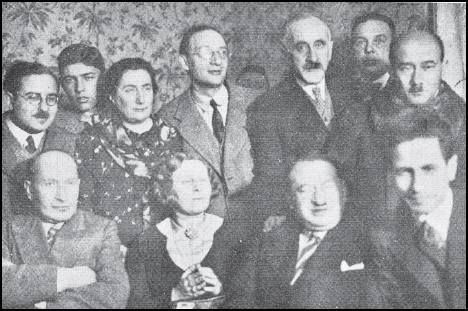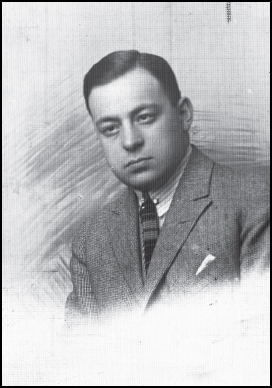CHAPTER 70
Auctioning Off the Folkstsaytung
Our daily newspaper, the Folkstsaytung, the central party organ of the Bund in Poland, was always struggling financially. It had almost no advertising, the most important source of profit for a newspaper. What firm would advertise in a newspaper read by poor workers who earned hardly enough for a piece of bread? Without advertisements, and subsisting only on pennies collected from periodic appeals to workers, it was really difficult for the Folkstsaytung to survive—it was always drowning in debt. Because of these debts, it was continually faced with being auctioned off, and more than once, it took a minor miracle to fend this off.
One time such an auction almost ended in disaster. A debt of around 40,000 zlotys had accumulated. The creditors refused to wait any longer, and the assets of the Folkstsaytung were to be auctioned off: the linotype, the rotary presses, and every last bit of property.
The bidders at auction, or as they were called in Warsaw, the “auction goers,” were primarily from the underworld. They were a well-organized band, a mafia. They bribed the court officials, who would officially conduct the auction, and the police, and nobody but they, were permitted to buy anything. They divided the city up amongst themselves by neighborhoods. The auction goers of one neighborhood dared not come to an auction belonging to another neighborhood. These “auction goers” reigned over their fiefdoms without any kind of competition.
In the Jewish neighborhoods, the auction goers were Jewish, and they knew they couldn’t mess with any Jewish political parties or social institutions. During an auction of the assets of a Yiddish school, or of the ORT, or of any Jewish social institution, one could pay off the Jewish auction goers for twenty zlotys or so. The institution would place their own people in the auction to buy up the assets for a pittance, and the institution could then carry on as before.
According to the law, an auction could be conducted three times. If the first time the bids were not judged high enough, a second auction could be conducted. If the second time the bids were again not sufficiently high, a third and last auction took place. This time the assets went to the highest bidder, no matter what.
The first two times, the auction of the Folkstsaytung’s assets went well. The Jewish auction goers of the neighborhood came, we gave them a little money, and they left. The third time we appointed Comrade Maurycy Orzech to “buy” the assets. He brought his lawyer with him, Schneerson, a good friend of ours (the father of our comrade, Issa Erlich). Another lawyer, Comrade Ludwig Honigwilll, represented the Folkstsaytung. On the day of the auction we were on time, waiting for the Jewish auction goers of the neighborhood to arrive so we could once again pay them off to go away. Orzech would then be able to legally “buy” the assets, and the Folkstsaytung would once again be saved.
Suddenly, at around eight o’clock in the morning, as we were waiting, ten Polish “buyers” come into the courtyard, all of them big men, “Goliaths,” with Kazik Morawski in the lead. When I saw them my blood ran cold. Kazik Morawski was a giant of a man and one of the wildest thugs in Warsaw. He was a rich man, one of the top leaders of the auction goers. His “fiefdom” was a Polish one, and he only bothered with big deals, for example, bidding on houses, large machines, entire factories, etc. I immediately understood what had happened. The Jewish auction goers were afraid to mess with the Bund, but not wanting to miss out on such a fat profit, they sent the strong-arm Poles to buy up the assets of the Folkstsaytung. They would be silent partners in the profits.
I mustered up my courage and, approaching Morawski, I said in a polite and friendly way: “Listen Mr. Morawski, what is it you need to buy at this auction? This is after all the Bund, a Jewish workers party—we are workers, why would you want to harm us and take away our property? Go away and leave us in peace.”
Answering angrily, he said, “I don’t want to know anything about any party, about any workers. One can make some ten thousand zlotys here. Get off me! You want to be a partner? I can take you on as one, but that’s all I can do for you.”
So I began again to try to persuade him with the same arguments, and then again, and then once more. But he wouldn’t budge. I saw I would not get anywhere with him by being polite and friendly. So finally I said to him, this time in a firm and decisive tone, “You will not buy here!”
With an ironic smile, he measured me up and down and asked, “What? You want to fight with me?”
I answered him with the same decisiveness as before, “No, we won’t fight, but you will not buy anything here!”
He saw from my tone that this was not some little game, that it was not so easy to dismiss me with a wave of the hand, so his tone became a little softer, and he called me aside and said, “Listen, since I have come here, I must buy. This is no longer about money or profit. This is now about my reputation. Here is my gang. They see everything. I cannot leave with nothing. If you want to be a partner, you can be a partner.”
I answered him, “You are concerned about your reputation, but I am concerned about my very existence!” Apparently I said this with such desperation, that it impressed him. He grew silent, changed altogether, and suddenly said, “Come, let’s go,” and added a curse that is unprintable.
I answered him: “No, I cannot leave here with you alone, and you cannot leave here. You have to see to it that your people do not bid on anything. Sullenly, he then stepped back a bit to the side and signaled his people with a wink. They understood what this wink meant, and also stepped back to various sides.
The auction began. Comrade Orzech bid. Morawski and his buddies stood quietly on the sidelines, sullen but silent. The auction was quickly over. Orzech was the buyer.
Now that Orzech was the legal proprietor of all the assets of the Folkstsaytung, I went over to Comrade Noyekh, who had been standing the whole time, watching from a distance, and who understood all that was happening, and I said to him, that I needed 100 zlotys (about 20 dollars) to take the gang of Polish auction goers for a good lunch. Comrade Józef (Noyekh’s other name) asked me with a touching, innocent naiveté, “100 zlotys? So much money? Wouldn’t 50 zlotys be enough?” I was too aggravated to explain to him why no less than 100 zlotys were needed. I stubbornly insisted on the entire 100!
I took the money and went over to Kazik Morawski and told him I was taking him and his gang to a restaurant. We all went off without a word to a nearby restaurant. They all seated themselves around a big table and began to order. When I heard what they were ordering, I almost lost my composure once again. I went over to Murawski and whispered in his ear, “Mr. Murawski, I don’t have enough money to pay for all this.” Still sullen, he answered, “I don’t need your money; I will pay myself!” They gorged and guzzled so much that it is even now hard for me to believe that Murawski paid almost 500 zlotys for this little luncheon. He most probably gave them all this food and drink because he wanted to erase the bad impression that he, Kazik Morawski, the król (king) of the Warsaw “auction goers,” retreated from a bunch of weak kikes.
But Kazik Morawski did not pull back simply because of my firm and decisive attitude. He certainly thought things over during our dispute and understood that if he bid and bought, things would not go so smoothly for him. He well knew what the Bund was, and that it was friendly with the PPS, and that bidding might cost him more than it was worth.
When I brought back to Comrade Józef the 100 zlotys and told him the story, he gave me a happy smile.
Since I have mentioned Maurycy Orzech’s name, I must go on to tell something about this comrade and his refined personality.
His family was one of the richest Jewish families in Warsaw. I had known him for many years, since he was fifteen. At that young age he was already a member of the Bund. I became a young guest in his house. His grandmother, who lived with them, used to get angry with me, because when I would come into their house in the winter, I would often carry mud onto their shiny polished floors with my wet shoes (I had no galoshes at the time). Comrade Orzech later inherited a large fortune and became a partner in a large manufacturing business, partner to a large bazaar on Franciszkańska 19, with an interest in other enterprises as well. But his personal goodness, his refined persona, his loyalty to the Bund, did not diminish in the slightest.
When he would meet me, he would always ask if I needed anything for needy comrades—money or things. Quite often, in fact, I would tell him that an unemployed comrade needed a suit of clothes or a coat. He would then take me home with him, would open his closet, full of fine clothes, and tell me to take whatever I wanted. One time in such a moment he said the following: “You know what, Bernard, what do you need me for at all for this? I will tell my wife that you can take anything you want, whenever you want.” And he asked his wife to come in and told her to always let me into the house and let me go to the clothes closet to take whatever I wanted from it.
I would actually quite often benefit from this privilege. And if a needy comrade was in need of some clothes, and was more or less the same size as Orzech, I would go to his house and take whatever was needed, and clothe the comrade with it. His wife, who probably could not entirely grasp all this craziness of her husband, was, nevertheless, very loyal to all his work for the party.1

Figure 117. Henryk Erlich and some of the leading staffers of the Bundist daily newspaper, Di Folkstsaytung, in Warsaw. From the Archives of the YIVO Institute for Jewish Research, New York.
Note
1.After the outbreak of World War II, Maurycy Orzech fell into and then escaped from Nazi hands; he then entered into Nazi-occupied Warsaw, becoming the chairman of the underground Bund there. I have told about his death and that of his family in my book, Finf Yor in Varshever Geto (Five Years in the Warsaw Ghetto, translated as The Stars Bear Witness, New York, 1948, Viking Press).—BG
